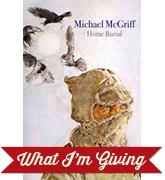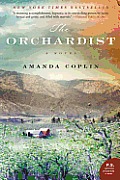
 In this special series, we asked writers we admire to share a book they're giving to their friends and family this holiday season. Check back daily to see the books your favorite authors are gifting.
In this special series, we asked writers we admire to share a book they're giving to their friends and family this holiday season. Check back daily to see the books your favorite authors are gifting.÷ ÷ ÷
Michael McGriff and I met as undergraduates at the University of Oregon. Our mediums were different — he wrote poetry and I wrote prose — but our obsession was the same. We both strove to capture in language the places where we were from — Wenatchee, Washington, for me, and Coos Bay, Oregon, for McGriff. These places haunted us, were the objects of joy and despair, an immense spiritual tangle.
McGriff's work — a chapbook, Choke, was published in 2006; Dismantling the Hills, in 2008; and Home Burial, in 2012 — can be read as an elegy to the aftermath of industry — Coos Bay was once a booming logging town — when the place of busyness is now quiet, abandoned, empty, depressed. The poems carry the weight of a perpetually rainy, damp climate, are full of shadows and ocean water and long silences between people who have lived together their entire lives.
 The atmospheric quality of the poems works its magic, and so do the narratives. McGriff writes of drug addicts, laid-off men and women, desperate characters as inspired and puzzled by the landscape — and what it all means — as he is. The atmospheric quality calls to mind the work of the Swedish poet Tomas Transtromer (McGriff, incidentally, has translated a book of Transtromer's, The Sorrow Gondola), and the narrative quality reminds one at different moments of Philip Levine, Theodore Roethke, and Larry Levis.
The atmospheric quality of the poems works its magic, and so do the narratives. McGriff writes of drug addicts, laid-off men and women, desperate characters as inspired and puzzled by the landscape — and what it all means — as he is. The atmospheric quality calls to mind the work of the Swedish poet Tomas Transtromer (McGriff, incidentally, has translated a book of Transtromer's, The Sorrow Gondola), and the narrative quality reminds one at different moments of Philip Levine, Theodore Roethke, and Larry Levis.
The book I am recommending, Home Burial, is McGriff's latest collection of poems and, I believe, his finest. It is a book I come back to again and again for how, according to a review in the New York Times, McGriff "plung[es] into the depths of some underground waterway in the American psyche — what's happening to the environment, what's happening to jobs, what's happening to families — and ris[es] to the surface to show us the debris." It is not only what McGriff shows us but how he shows us: he drags us down into the dream, an experience which is simultaneously wonderful, terrifying, and sorrow-inducing. In other words, McGriff is a vital poet, and this is important work. Home Burial will be on my bookshelf, close at hand, forever.